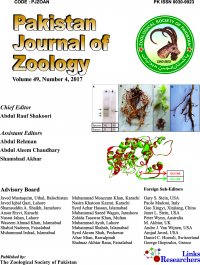Genetic Polymorphism of ACE (I/D) is Associated with Diabetic Nephropathy in Pakistani Subjects
Genetic Polymorphism of ACE (I/D) is Associated with Diabetic Nephropathy in Pakistani Subjects
Umara Amir ud Din1, Waqas Ahmed Khan1*, Khurrum Shahzad1,2, Basharat Ali3, Misbah Hussain1,4 and Fazli Rabbi Awan4
ABSTRACT
Diabetic nephropathy (DN), also known as diabetic kidney disease (DKD), is a leading cause of morbidity and mortality in diabetic patients. A major cause of DKD is high blood pressure (hypertension) which remains uncontrolled chronically. Renin angiotensin aldosterone system (RAAS) is a major regulator of the blood pressure, electrolytes and fluid homeostasis. RAAS plays a key role in modulating the sodium metabolism, vasoconstriction, vascular tone and renal hemodynamics. Angiotensin converting enzyme (ACE) is a key member of RAAS pathway and target for anti-hypertensive drugs. ACE (I/D) polymorphism studies for its association with kidney function and risks of DN have been reported in different populations but with varying results. Hence, the objective of current study was to study the association of ACE (I/D) polymorphism with risk of DN in Pakistani subjects. For this study, 702 subjects were recruited who were divided into three groups; healthy control (n=222), diabetics without nephropathy (n=230) and diabetics with nephropathy (n=250). Clinically important biochemical parameters including glucose, uric acid, urea, creatinine, albumin, total protein cholesterol, and liver enzymes (ALP, ALT, and AST) were measured for all subjects. Genotyping for ACE (I/D) polymorphism was done by PCR assay. Statistical analysis showed that subjects with DN had higher (67%) frequency of ID genotypes and the ID genotype carriers also exhibited higher levels of creatinine (6.2±3.9 mg/dL) and urea (99±41 mg/dL). Moreover, logistic regression analysis also indicated that ACE ID genotype carriers had a 2.5-fold higher risk of DN as compared to the II genotype carriers. Hence the present study shows a strong association (OR 2.53, CI: 1.65-3.88, p<0.001) between ACE (I/D) polymorphism and DN in Pakistani subjects.Genetic polymorphism of ACE (I/D) is associated with diabetic nephropathy in Pakistani subjects. ACE ID genotype might also be considered as an important factor in risk stratification of the renal function for DKD and high blood pressure patients.
To share on other social networks, click on any share button. What are these?










